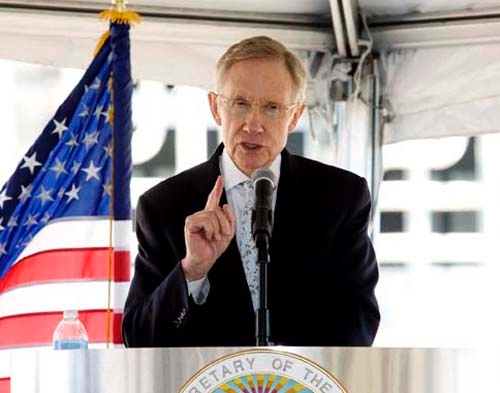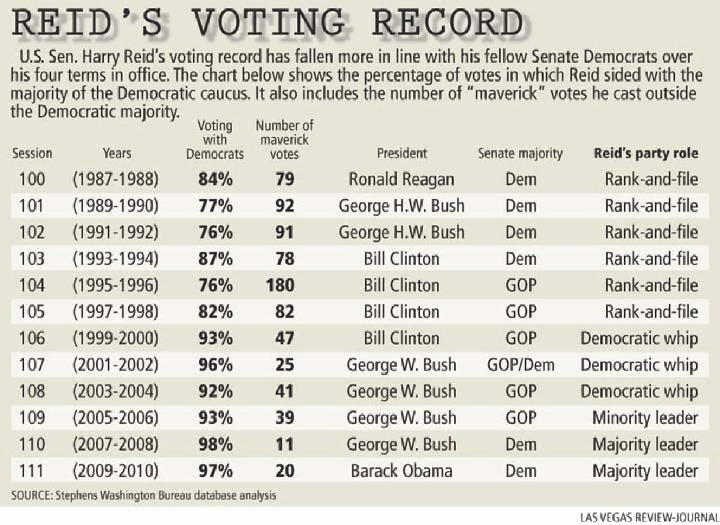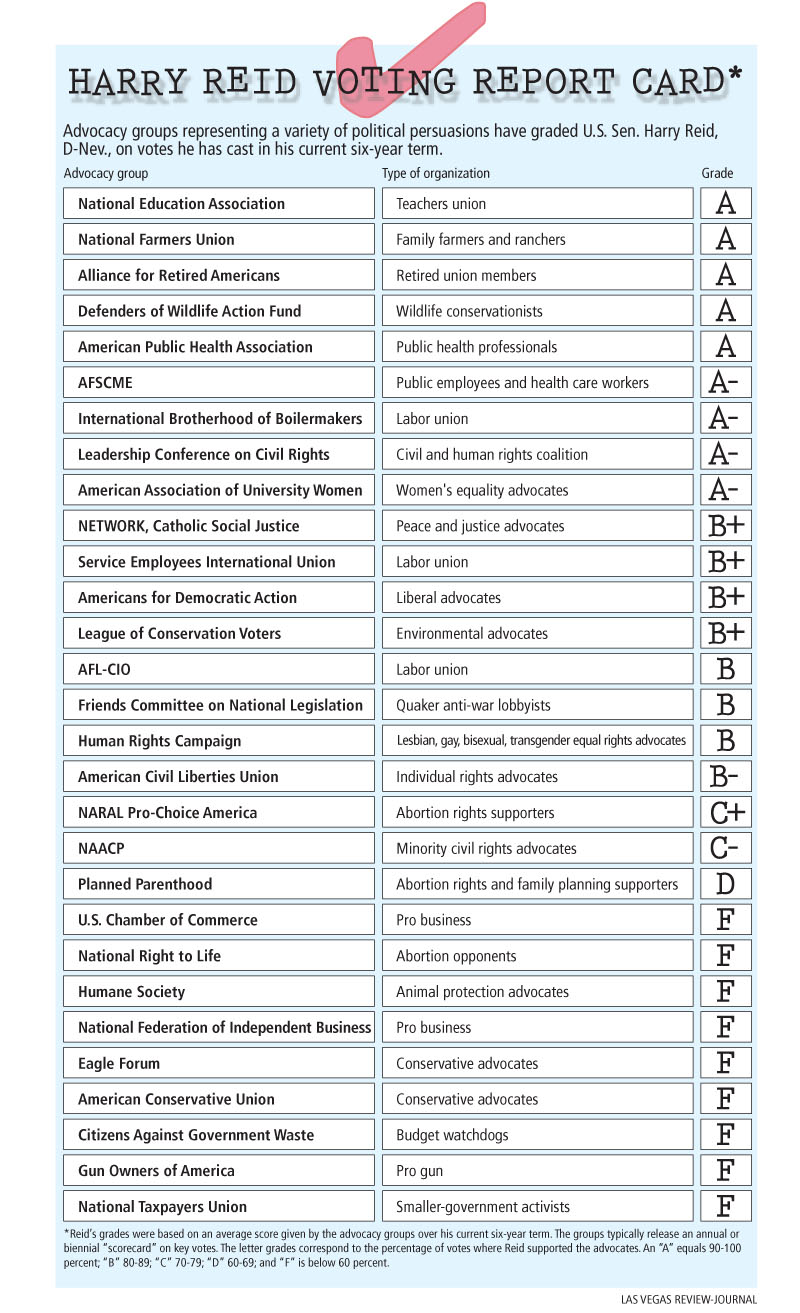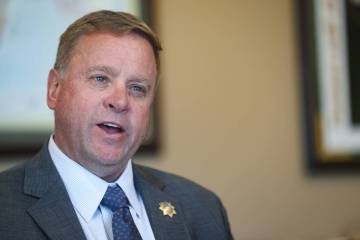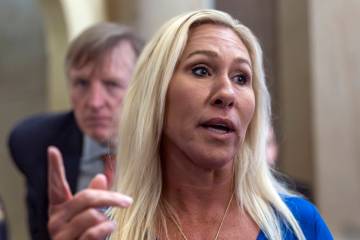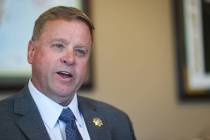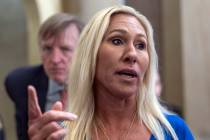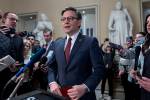Harry Reid grows more Democratic
WASHINGTON — As Sen. Harry Reid has moved from back-bencher to majority leader, he has fallen more in line with the Democratic Party, according to a review of his voting record over the last 24 years.
The Nevadan sided with his Democratic colleagues on 79 percent of votes during his first six-year term when he cast 262 votes against the party line on highly publicized issues such as abortion, missile defense, foreign trade and guns that earned him a reputation as a swing vote.
“He does not want to earn a reputation as a liberal and so rile the significant conservative element of his constituency,” Congressional Quarterly said in the 1990 edition of “Politics in America.”
“But he also wants to cooperate reasonably often with the Democratic leadership ... that helps him retain good standing and perpetuate the attention paid to a swing voter,” it added.
Since assuming a party leadership role in 1999, Reid has voted with the Democrats nine out of 10 times. And, as majority leader since 2007 his voting record has been about as purely party line as Ivory is soap. Reid effectively has voted with the party 97 percent of the time.
Reid opposed the majority of Democrats on 31 votes over the last four years, after discounting votes cast strictly for parliamentary purposes. Where he parted company with his colleagues were on a few familiar issues including guns, abortion and the U.S. flag, issues that reflected the cultural values of his home state.
A review of the 8,169 roll calls cast since Reid entered the Senate in 1987 charts his evolution. At the same time, voting scorecards compiled by interest groups suggest Reid has moved to the left since succeeding Sen. Tom Daschle as Democratic leader in 2005.
Reid through a spokesman defended his voting record, saying it is not driven by partisanship or ideology.
“Regardless of which party is in power, how partisan the atmosphere, or how specific interest groups choose to analyze his votes, Sen. Reid has always based his decisions on what he thinks is right for Nevada,” spokesman Tom Brede said.
On education, welfare, health and labor issues Reid’s votes reflect the view shared by most Democrats that free enterprise cannot provide everything that Americans need. Government also has a role.
“I am as much a believer in the genius of the American free-enterprise system as anyone, but it was not the market that built the Interstate Highway System, sent man to the moon, or conceived of Social Security, the greatest social program since the fishes and the loaves,” Reid wrote in his 2008 autobiography “The Good Fight.”
Political observers offer varying thoughts about Reid’s voting record as he seeks re-election to another six-year term.
Keith Poole, a professor of politics at the University of Georgia, says Reid fits into a trend in Congress where party-line voting has steadily increased over the past two decades.
“The whole system is polarizing,” Poole said.
Poole, who has charted congressional voting patterns going back to the late 1800s, said the 110th Congress of 2007-08 was the most partisan in 120 years. The 111th session may yet surpass it.
When viewed through that prism, Poole finds that Reid consistently has fallen in the middle of the Democratic pack. Over his Senate career, there have always been dozens of Democrats voting more liberal than Reid. He’s not as liberal, for instance, as Illinois Sen. Dick Durbin or Ohio Sen. Sherrod Brown nor is he as conservative as Nebraska Sen. Ben Nelson or Indiana Sen. Evan Bayh.
“He has moved left over time but that is more a function of the increasing polarization of Congress,” Poole said. “Reid is basically somebody who is to the right of the center of his party.”
Reid also has a unique role as majority leader in shaping Senate floor debate, which cannot be measured by votes alone, said Michael J. Wilson, national director of Americans for Democratic Action.
“Because he literally decides what to vote upon, he is going to be in favor of more stuff that comes up,” Wilson said.
He cautions against trying to pigeonhole Reid.
“It is very difficult to define any person on one issue when they’ve taken hundreds and thousands of votes like Sen. Reid has,” Wilson said.
Yet a review of congressional voting scorecards produced by liberal, conservative and special interest groups suggests that Reid has become more liberal since taking on a leadership role.
Americans for Democratic Action shows Reid voting 88 percent of the time between 2005 and 2009 in favor of positions taken by the self-described “forthright liberal voice of this nation.” That voting record is a substantial increase from Reid’s first five years in office, when he was with the Americans for Democratic Action on 65 percent of the votes it scored.
Reid opposed Americans for Democratic Action on just one of 20 votes scored by the group in 2009, voting against an amendment to the health care reform bill that would have allowed people to import prescription drugs from overseas.
Scorecards compiled by the American Conservative Union, the nation’s oldest and largest grass-roots conservative organization, also suggest a shift to the left in Reid’s voting record. During his first five years in the Senate, Reid voted with conservatives 28 percent of the time, according to the roll call votes highlighted by the American Conservative Union.
Reid stood with the conservatives during those early years on abortion, gun rights, death penalty, flag desecration and missile defense votes.
But as majority leader, Reid sided with the conservative group on just eight of 125 votes they scored between 2005 and 2009.
Reid has consistently scored high marks from labor unions including those from the AFL-CIO, the American Federation of State, County and Municipal Employees, and the National Education Association.
The U.S. Chamber of Commerce, National Federation of Independent Business and Citizens Against Government Waste typically give Reid poor ratings.
Under Senate rules, 60 votes are usually needed to bring a bill up for a vote. With few Republicans willing to defect on any vote, Reid has had to get all the Democrats aligned to move legislation.
As a result, only a handful of senators cross party lines. Among Democrats, 54 voted with their party more than 90 percent of the time. Six others fell below that level with just two under 80 percent. Republicans follow a similar pattern, according to a review of 645 roll call votes cast since January 2009.
That voting pattern, Wilson says, makes Democrats appear more liberal and Republicans more conservative than may actually be true.
Reid, for instance, may appear more liberal when viewed next to Sen. John Ensign of Nevada, who is one of the most conservative senators, according to Poole’s analysis. Ensign, a Republican, has ranked between 95th and 98th on Poole’s liberal scale.
The National Journal found that in 2009 Reid and Ensign had the greatest liberal/conservative gap of any pair of senators, based on its vote analyses. Reid voted liberal 78 percent and Ensign 10 percent. South Dakota’s senators had the second largest gap at 60 points.
Criticized from both sides on abortion
The votes Reid has cast over his career that went against the majority of Democrats included dozens related to abortion and gun rights.
Those votes would seem to back up Reid’s statements saying he is an abortion opponent and pro-gun. But other votes raise doubts among the special interests that follow these controversial and complex issues.
Reid has voted against late-term abortions and allowing federal funds to be spent on abortion services except under rare circumstances of rape or when the pregnancy threatens the life of the woman. Those exceptions are in accordance with his Mormon faith.
“My belief in the sanctity of life is why I have repeatedly voted against using taxpayer money for abortions,” Reid said in a speech last December. “It’s why I have repeatedly voted against covering abortions in federal employees’ health insurance plans, and repeatedly voted against allowing federal facilities to be used for abortions,” Reid said.
“Sen. Reid’s record is consistently pro-life on the issue of abortion,” said Ted Miller, a spokesman for NARAL Pro-Choice America, which supports a woman’s right to have an abortion.
Lisa Maatz, director of public policy for the American Association of University Women that advocates abortion rights, says Reid has a strong record in support of most issues that it supports.
“Truthfully, the only place we have parted company is on choice. He has a mixed record there,” she said.
Reid has said that proponents and opponents of abortion need to “find common ground for the greater good,” a message that some abortion opponents believe signals Reid is not fully committed to the cause.
Reid has promoted access to contraception, sponsoring legislation with Sen. Olympia Snowe, R-Maine, to require insurance companies to cover women’s contraceptives and framing the issue as one of women’s health.
He also has supported measures to provide birth control and family planning services both here and abroad.
Douglas Johnson, legislative director of National Right to Life, said he does not buy into Reid’s statement that he is an abortion opponent.
“Over the past 10 years, no lawmaker has been more instrumental in passing pro-abortion bills and confirming pro-abortion nominees to key offices than Harry Reid,” he said. “Harry Reid may label himself pro-life but he is a major political asset to the pro-abortion movement.”
Johnson says Reid tried to appease both sides of the abortion issue, pointing specifically to two votes cast back-to-back in March 2004 that he said were "diametrically" opposed to each other.
Reid voted in favor of the “Unborn Victims of Violence Act,” which recognized unborn children as victims when they are injured or killed during the commission of a federal crime. Just prior to that vote, Reid supported an amendment that would have stipulated that only the mother could be recognized as a legal victim.
The amendment, offered by Sen. Dianne Feinstein, D-Calif., instead would have created a separate federal offense for “interrupting the normal course of a pregnancy.”
Besides Reid, 11 other senators voted both for the Feinstein amendment and then for the bill.
Johnson also was critical of Reid’s successful effort to block an amendment during last year’s health reform debate that would have instituted a clear and permanent ban on federal funding for abortion services.
Cecile Richards, president of the Planned Parenthood Federation of America, wrote in March that “at a crucial moment” Reid went to the Senate floor and spoke against the amendment.
“Despite his opposition to abortion rights, in a true profile of courage, he pointed out that the health care bill was inappropriately being used as a vehicle to litigate abortion,” she wrote.
Guns, guns, guns
Reid’s votes on gun rights also have riled both sides.
In a move that polished his standing among some gun owners, he secured $60 million in federal funds for a shooting park in Clark County that opened this year.
At the park’s dedication in April, Reid won praise from Wayne LaPierre, executive vice president of the National Rifle Association.
LaPierre insisted that the park would not have existed without Reid’s support. He thanked him for his support “every day at the federal level” for the Second Amendment and the rights of American gun owners.
Yet when the NRA floated the idea of endorsing Reid’s re-election this year, the outcry among members was so strong that the organization added a message to its voice mail saying officers had not yet decided.
In the end, the NRA endorsed neither Reid nor Sharron Angle, his Republican opponent.
Larry Pratt, executive director of Gun Owners of America, scoffs at the notion that Reid has been friendly to the membership.
The group has a page on its website criticizing dozens of votes that Reid has cast since 1991, including support for waiting periods to purchase handguns, required background checks at gun shows, and restrictions of guns in national parks.
Joshua Horwitz, executive director of the Coalition to Stop Gun Violence, sees Reid’s record quite differently.
His view is that Reid has hardened his opposition to gun control over the past decade to win support from the politically powerful rifle association.
Reid supported efforts in the Senate to overrule a local District of Columbia ban on guns. Given the gun violence in the city, Horwitz said the pandering to the gun lobby on the issue was a “tragic” error.
“Ten years ago Harry Reid was a friend of ours. As I recall, at least friendly enough to ask our advice. Certainly a lot has changed,” Horwitz said.
Reid voted for a 1994 assault weapons ban and the 1993 Brady bill that required background checks for the purchase of handguns. Yet, he opposed efforts in 2004 and 2009 to restore the ban on assault weapons.
Brede dismisses Gun Owners of America as “primarily a fringe political group” that is more interested in playing politics than protecting gun rights. He said Reid has backed gun owners on many occasions.
“Senator Reid has a long record of standing up for Nevadans’ Second Amendment rights,” Brede said. “He was instrumental in passing legislation to protect gun manufacturers from junk lawsuits and added protections to health insurance reform to ensure that he and other gun-owning Nevadans are not punished with higher premiums simply because they choose to own firearms.”
On the assault weapons ban, Reid opposed its inclusion in a broader crime bill in 1994 but voted for the overall bill because he favored most of its other provisions, Brede said.
Given opportunities to vote on whether to reinstate the ban in 2004 and 2009, Brede said Reid voted against the gun owner restriction.
Change of heart on immigration
Reid has acknowledged having at least one major change of heart on a controversial subject: immigration.
In his early days in Congress, Reid favored stricter policies on legal and illegal immigration, seeking to protect American workers and taxpayers from the costs associated with low-skilled immigrant workers and their families.
As a member of the House in 1986, Reid opposed granting amnesty to 3.2 million illegal immigrants as part of a larger bill that made it illegal for an employer to knowingly hire or recruit non-citizens without lawful work permits.
In 1993, Reid introduced legislation to dramatically limit the number of immigrants allowed into the United States. The bill would also have increased sanctions against employers of illegal immigrants, required a federal identification card, and boosted border patrols.
Reid also proposed denying citizenship to babies born to illegal immigrants, the same 14th Amendment matter that is being debated as part of today’s wrangle over immigration.
Reid dropped the controversial provisions from the bill a year later, and has apologized for taking such a hard stance on immigration.
As majority leader, Reid has sponsored immigration reform legislation that would provide a path to citizenship for illegal immigrants. He has also pushed for passage of the DREAM Act that would give children of illegal immigrants an opportunity to become citizens by attending college or serving in the military.
When challenged by Republicans about his earlier held views, Reid spoke again in 2006 about the mistake he had made in 2003.
“That is a low point of my legislative career, the low point of my governmental career. That is why I believe we need comprehensive immigration reform today,” Reid said on the Senate floor in 2006.
Reid does not support amnesty for illegal immigrants but would provide those living in the country a path toward citizenship if they pass background checks, pay penalties and fines, learn English and pay taxes, Brede said.
Reid also wants employers of illegal immigrants to be held accountable and supports efforts to secure the nation’s borders to prevent undocumented entry into the United States, he said.
Activists on both sides of the immigration issue have noted the change in Reid’s position.
Amy Novick, executive director of Immigrants’ List, a pro-immigration political action committee, says Reid has been “an essential ally” as lead sponsor of the 2007 immigration reform bill.
Reid supported three key pieces of legislation that Immigrants’ List used to rate the U.S. Senate including comprehensive reform bills proposed in 2006 and 2007 as well as a 2007 version of the DREAM Act.
The Senate came close to passing comprehensive immigration reform in 2007 but after months of debate and bipartisan negotiations no deal emerged.
A report card issued by NumbersUSA, which wants to limit immigration into the U.S., gave Reid a failing grade based on his voting record since becoming majority leader. Over his entire career, the group says he earned a C-minus.
Americans for Legal Immigration, a political action committee that opposes amnesty for illegal immigrants, has endorsed Republican Sharron Angle in the Nevada race.
Contact Stephens Washington Bureau reporter Peter Urban at purban @stephensmedia.com or 202-783-1760.
• Spreadsheet of all the votes that Sen. Harry Reid has cast that opposed the majority of the Senate Democrats
• Republican U.S. Senate candidate Sharron Angle’s voting record in the Legislature
• Key Reid votes on abortion, gun control, immigration



